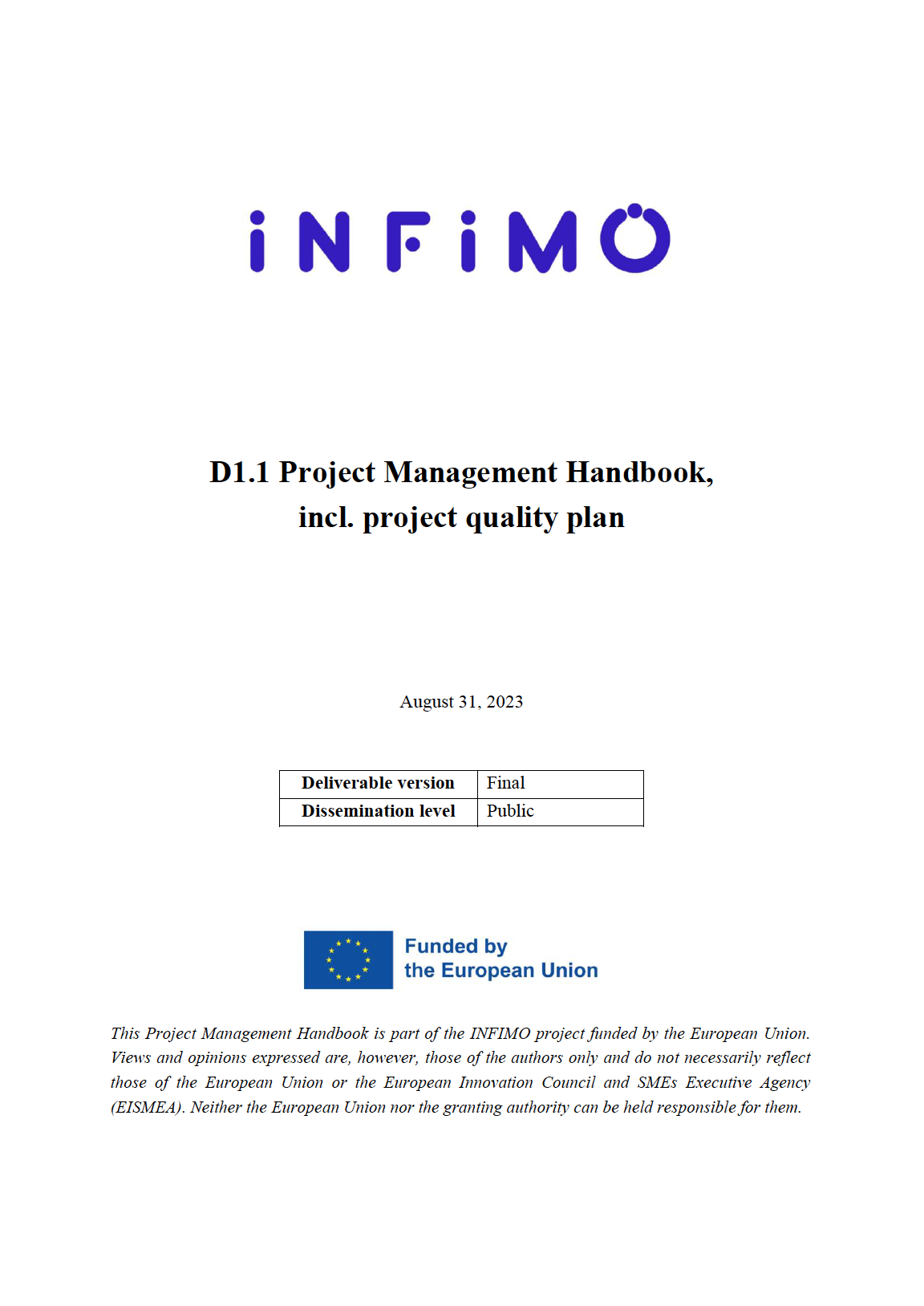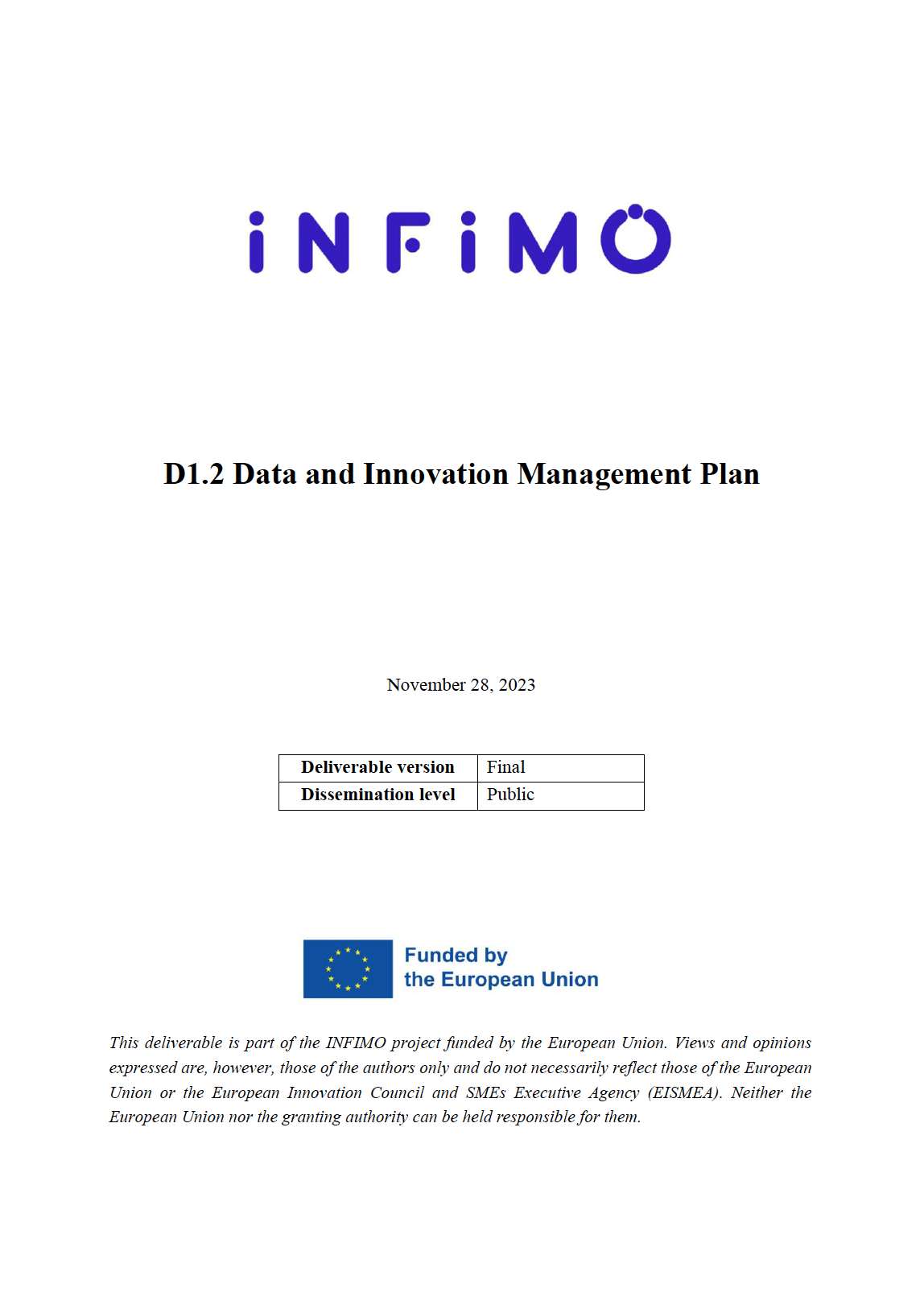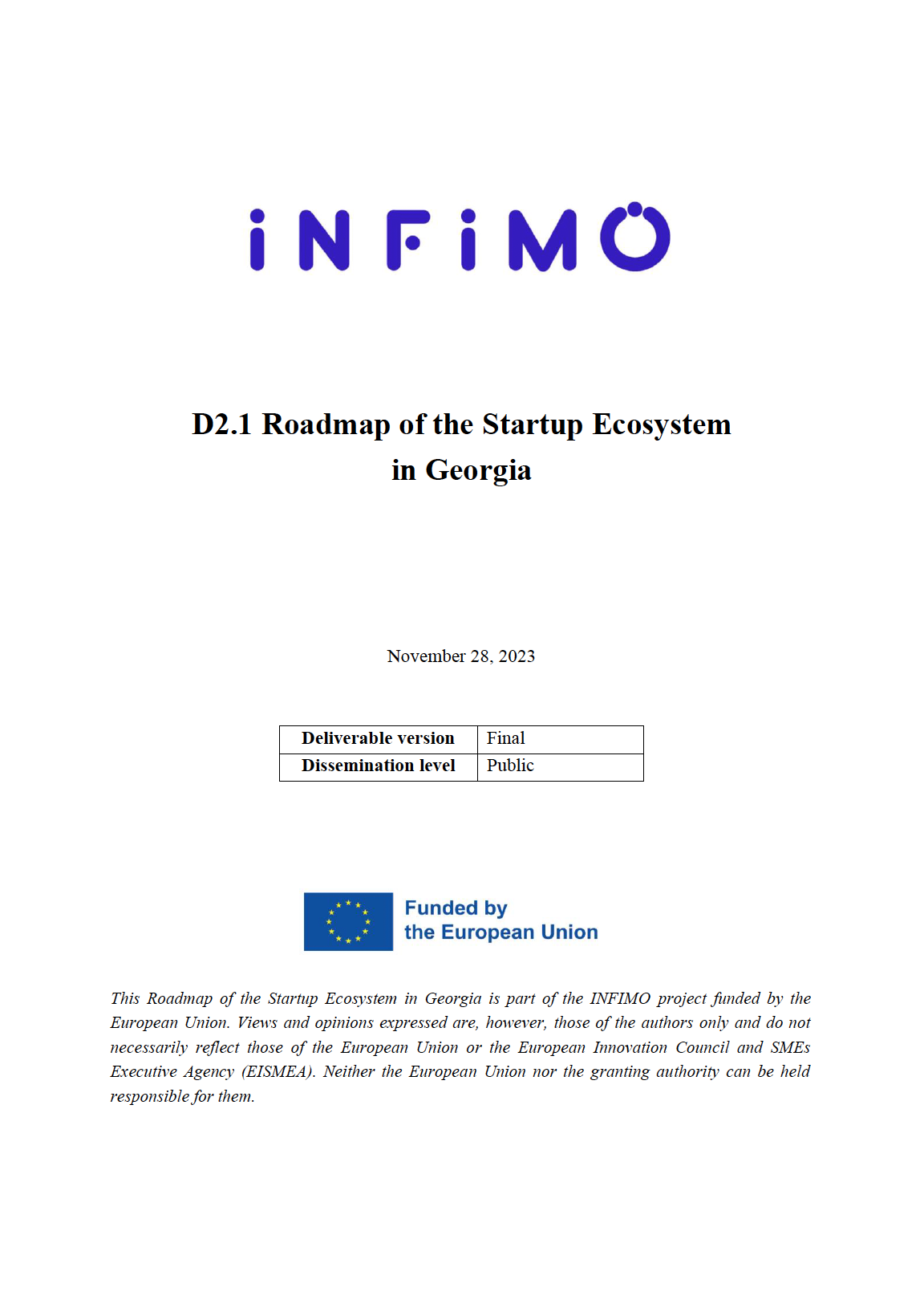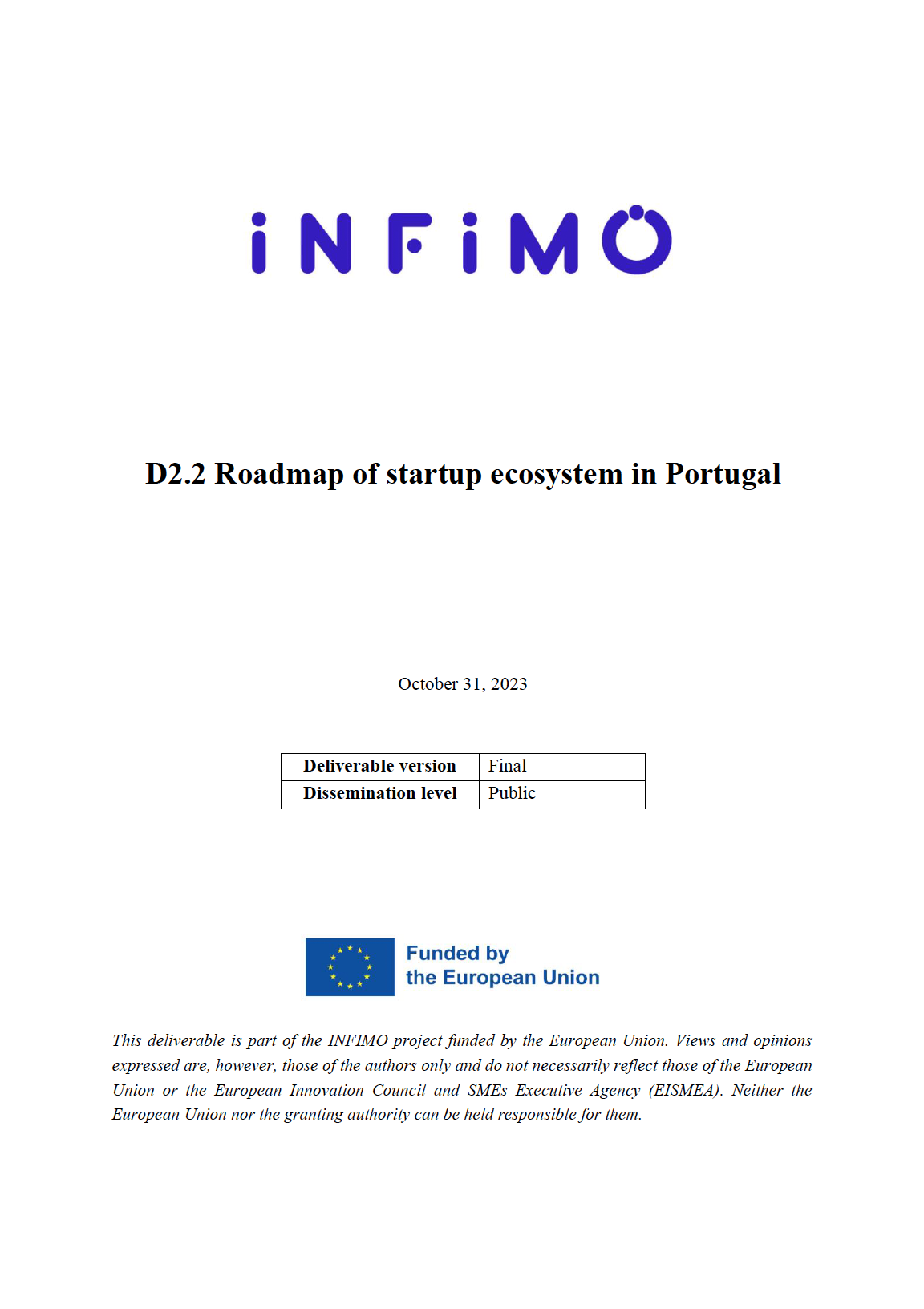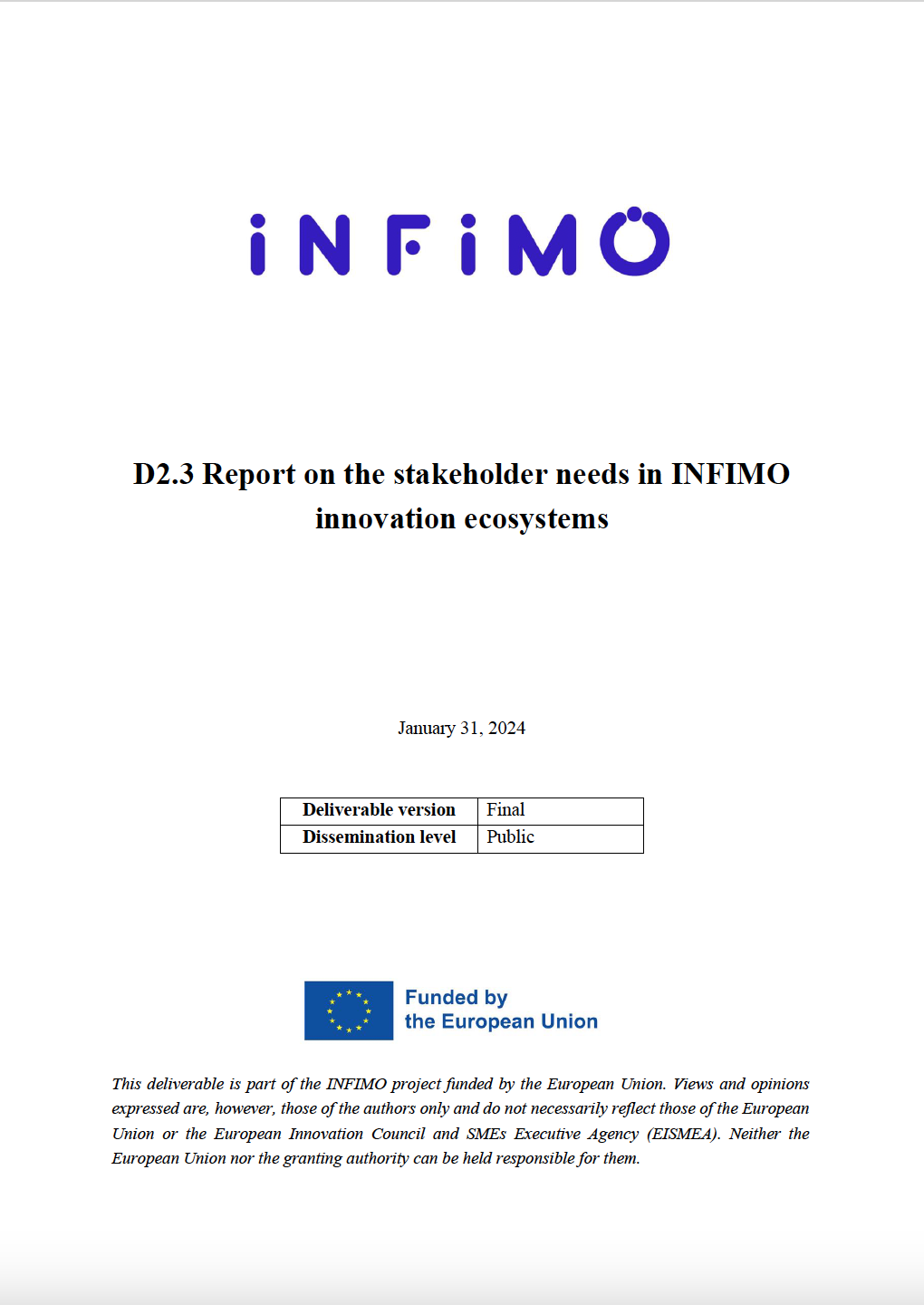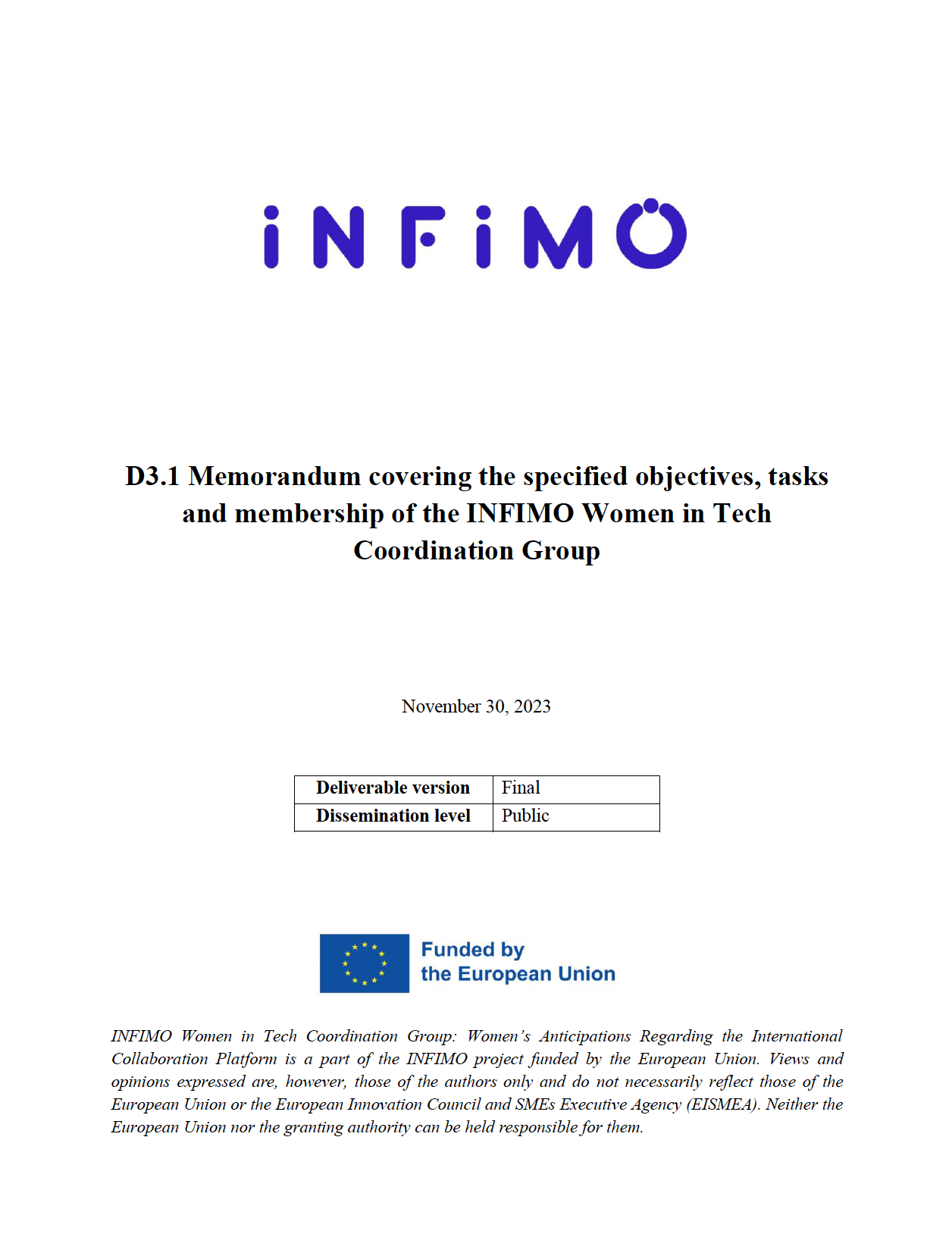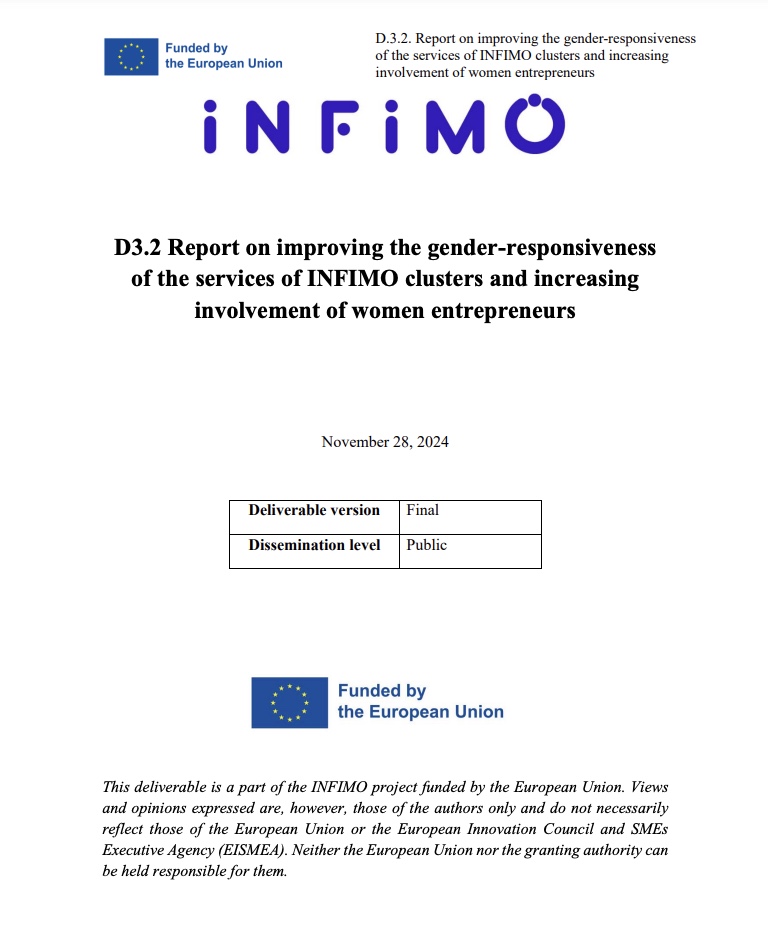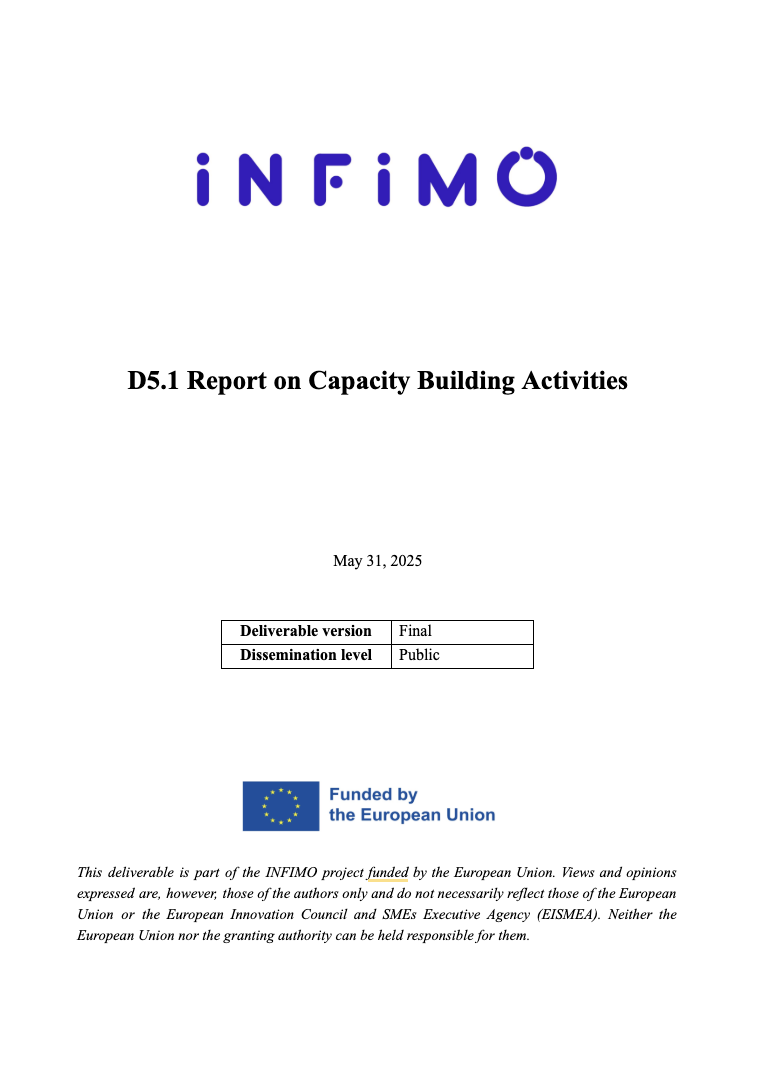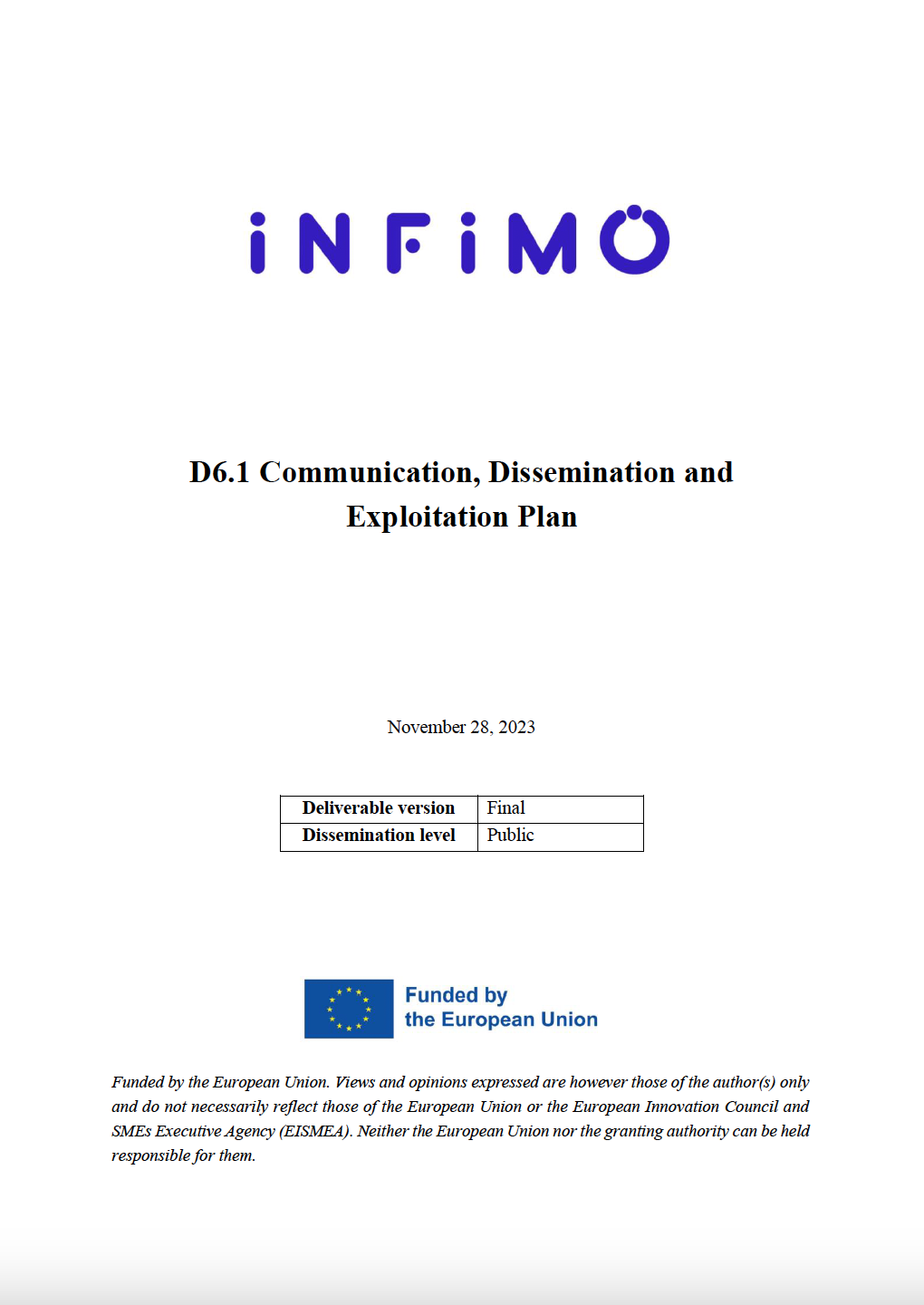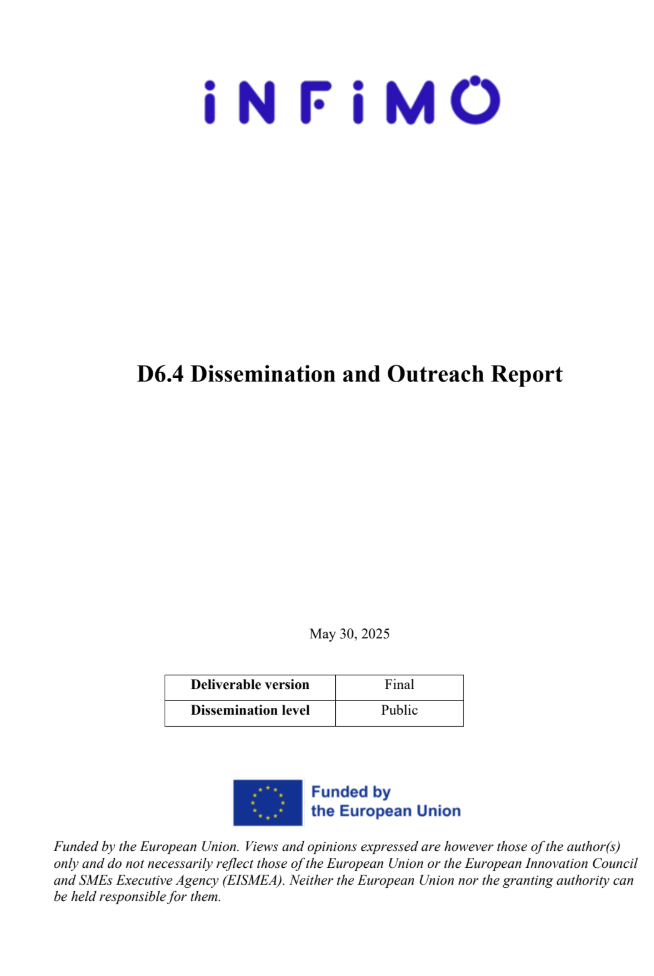Work Packages and Project Deliverables
The INFIMO project is structured into six work packages (WPs). Each WP has a set of public deliverables listed below.
WP1. Project Management
WP1 leader: ITL
WP1. Project management covers overall project management activities that ensure smooth work processes and support all other WPs throughout the project related to internal communication management, financial management and reporting, monitoring and risk management, data, knowledge and innovation management.
WP1 Deliverables:
- D1.1 Project Management Handbook, incl. Project Quality Plan
- D1.2 Data and Innovation Management Plan
D1.1 Project Management Handbook, incl. Project Quality Plan
The purpose of the Project Management Handbook (PMH) is to describe the mechanisms of project management and quality control used throughout the INFIMO project.
The document serves as a framework for the Project Management Team and Steering Committee to effectively carry out management activities, as well as to monitor and mitigate the project risks. It also serves as a reference for consortium partners to conduct their contractual project activities with expected quality levels.
The PMH primarily covers the procedures and best practices for the following project management activities:
- Management structure
- Project workspace
- Internal communication
- Quality control of deliverables
- Reporting of project activities
- Risk management
D1.2 Data and Innovation Management Plan
Throughout the collection, processing, analysis, use, storage, and dissemination of data in the context of INFIMO, the project consortium pays careful attention to data protection and privacy and ensures that data is kept securely. At the same time, the consortium follows the EC’s open science approach and FAIR principles as much as they apply to the project activities.
The Data and Innovation Management Plan (DMP) is a document that establishes processes for collecting, storing, and safeguarding data collected during the INFIMO project. The DMP will guide all data management actions throughout the project. It is a reference document for consortium partners to properly conduct their project activities by paying sufficient attention to how data (particularly personal data) is handled.
The DMP covers the procedures for the collection, processing, analysis, use, storage, and dissemination of data in the context of INFIMO, covering:
- Data Collection Moments
- Data Collection Principles
- Data Processing and Storing
- Innovation Management and Open Access to INFIMO Knowledge
WP2. Development of the collaboration strategy
WP2 leader: BIA
WP2. Development of the collaboration strategy starts with analysing the needs of key innovation stakeholders in the involved ecosystems. Building upon that, a joint collaboration strategy and action plan will be developed, outlining an extended “opening-up“ strategy defining strategic action lines and concrete activities in the mid-term perspective.
WP2 Deliverables:
- D2.1 Roadmap of the Startup Ecosystem in Georgia
- D2.2 Roadmap of Startup Ecosystem in Portugal
- D2.3 Report on the Stakeholder Needs in INFIMO Innovation Ecosystems
- D2.4 INFIMO Collaboration Strategy and Action Plan
D2.1 Roadmap of the Startup Ecosystem in Georgia
This roadmap presents a comprehensive mapping of the Georgian startup ecosystem that delineates the principal stakeholders, encompassing startups, scale-ups, venture capitalists, accelerators, incubators, and other entities integral to fostering innovation.
This roadmap systematically examines and maps the current state of Georgia’s startup ecosystem to improve access to information about the local startup community and optimize targeted communication, inspiring new partnerships and strengthening collaboration among stakeholders.
The roadmap is structured into two main chapters:
- Breakdown of startup characteristics and components, benefits, growth catalysts, and the evolutionary progression of startup ecosystems.
- Thorough Overview of the Georgian Startup Ecosystem and Its Key Actors
D2.2 Roadmap of Startup Ecosystem in Portugal
Portugal’s burgeoning startup ecosystem has rapidly evolved in recent years, establishing its status as a prominent European hub for innovation and entrepreneurship. This comprehensive roadmap of Portugal’s startup ecosystem focuses on helping to effectively navigate the local dynamic landscape and foster strategic partnerships.
This roadmap functions as a vital framework, delineating the essential elements and stakeholders in Portugal’s startup ecosystem. It aims to facilitate improved communication, collaboration, and overall advancement within the Portuguese startup community.
The roadmap is structured into several key sections, each providing a unique perspective on Portugal’s startup ecosystem:
- Executive Summary
- Ecosystem Snapshot of Startups and Scaleups
- Ecosystem Snapshot of Enablers
- Ecosystem Snapshot of Corporations
- Ecosystem Snapshot of Policy, Regulation & Incentives
- Ecosystem Snapshot of Capital
- Ecosystem Snapshot of Areas of Improvement
- Conclusions
D2.3 Report on the Stakeholder Needs in INFIMO Innovation Ecosystems
The overarching goal of this report is to gather pertinent insights that will guide the INFIMO strategy-building process.
In the pursuit of fostering innovation and collaboration, the INFIMO project has undertaken a comprehensive analysis of the needs of key stakeholders within its innovation ecosystems. This report encapsulates the meticulous planning and execution of the analysis, orchestrated by MOBINOV as the lead coordinator, in collaboration with its partners. The primary objective is to identify and comprehend the multifaceted needs of stakeholders, with a particular focus on SMEs, start-ups, scale-ups, and women innovators.
The report is structured into several key sections:
- Innovation Ecosystem (Literature Review)
- Methodology
-
Results:
- Internationalization (Collaboration and Networking)
- Digitalization
- Potential Business Opportunities
- Gender
- Innovation Support Services
- Human Resource
- R&D and Intellectual Property - Conclusion
WP3. Enhancing gender-responsiveness and diversity
WP3 leader: GIC
WP3. Enhancing gender-responsiveness and diversity includes creating a joint Women in Tech coordination group, customising the services of the partnering clusters to make them more gender-responsive, and fostering higher involvement of women innovators as well as promoting gender equality and diversity throughout all activities of the involved innovation ecosystems.
WP3 Deliverables:
- D3.1 Memorandum covering the specified objectives, tasks and membership of the INFIMO Women in Tech Coordination Group
- D3.2 Report on improving the gender-responsiveness of the services of INFIMO clusters and increasing involvement of women entrepreneurs
D3.1 Memorandum of the INFIMO Women in Tech Coordination Group
INFIMO proposes the establishment of the Women in Tech Coordination Group, involving female entrepreneurs from INFIMO clusters and related ecosystems. This group will collaborate within the framework outlined in this Memorandum, with a specific goal of enhancing the participation of women entrepreneurs and innovators in the activities of the INFIMO clusters and increasing the gender-responsiveness of their services.
This memorandum endeavours to analyze the needs of women representing INFIMO’s partner organizations and their expectations for the international women’s cooperation platform. The insights gleaned from this analysis will serve as the informational and analytical foundation for the INFIMO Women in Tech Coordination Group (INFIMO WTCG), ensuring the efficiency of the cooperative framework to be created.
This memorandum covers the following list of topics:
- Overview of Gender Bias in Technologies: Situation in Estonia, Georgia, and Portugal
- Methodological Background of the Memorandum
- INFIMO WTCG: Objectives, Tasks, Membership
D3.2. Report on improving the gender-responsiveness of the services of INFIMO clusters and increasing involvement of women entrepreneurs
The ICT sector is a rapidly growing field with the potential to drive innovation and economic growth. However, gender responcivness and persistent stereotypes are hidden and the sector’s inclusivity is rather low.
This report gives the overview of current situation, the first steps that we made and the actions that each cluster should do.
The strategic plan focuses on fostering a gender-responsive and diverse ICT sector through the collaborative efforts of the INFIMO Women in Tech Coordination Group (WTCG) and its consortium members. WTCG aims to promote gender equality and advocate for women by supporting clusters with strategic guidance to enhance women’s involvement in innovation and improve the gender-responsiveness of services.
This memorandum covers the following list of topics:
- Review of Georgian ICT Cluster, Mobinov and ITL services for enchanced gender equality and diversity
- The key points that can be changed through ITL work
WP4. Enhancing collaboration between sectors and ecosystems
WP4 leader: MOBI
WP4. Enhancing collaboration between sectors and ecosystems is focused on developing and validating two different collaboration models to support various innovation actors from different sectors, taking into account the maturity levels of the ecosystems. This includes:
- A generic collaboration model between ICT and other sectors
- An advanced collaboration model between ICT and Mobility sector. The models developed will also be usable in other innovation ecosystems beyond the immediate project partnership.
WP4 Deliverables:
- D4.1 Generic Collaboration Model Development and Implementation Report
- D4.2 Advanced Collaboration Model Development and Implementation Report
WP5. Training, skills development and exchange of best practices
WP5 leader: MOBI
WP5. Training, skills development and exchange of best practices aims to take the skills, know-how and general capacity for innovation in the involved ecosystems to the next level. This includes mutual study visits focused on sharing best practices and deeper collaboration building, as well as training events for various innovation actors targeted (the specific topics will be chosen in line with the strategy-building process).
WP5 Deliverables:
- D5.1 Report on Capacity Building Activities
D5.1 Report on Capacity Building Activities
Capacity building is a cornerstone of the INFIMO project’s ambition to foster interconnected and inclusive innovation ecosystems in Estonia, Portugal, and Georgia. To this end, Work Package 5 (WP5) – Capacity Building and Skills Development was established to enhance the competencies of innovation actors by focusing on key topics relevant to the digital and green transitions, as well as gender inclusivity.
The consortium organised three international study visits, delivered seven joint training events, and reached over 240 participants across Estonia, Portugal, and Georgia. These activities provided critical support for strengthening cluster cooperation, advancing digital and green skills, and promoting inclusive innovation ecosystems.
WP6. Communication, dissemination and exploitation
WP6 leader: BIA
WP6. Communication, Dissemination and Exploitation supports the work in core WPs throughout the project, ensuring visibility of the project among the target groups and ensuring awareness related to its activities, benefits and impacts to wider audiences. It also leverages the linkages of the Modest and Moderate Innovator ecosystems with relevant pan-European networks. The WP also plans to exploit the project results, including working towards engaging additional sectors and innovation ecosystems that could benefit from the project results.
WP6 Deliverables:
- D6.1 Plan for Dissemination and Exploitation, including Communication Activities
- D6.2 Project Website
- D6.3 Project Exploitation Roadmap
- D6.4 Dissemination and Outreach Report
D6.1 Communication, Dissemination and Exploitation Plan
The CDE Plan is developed to be a practical framework for INFIMO’s day-to-day communications activities, which will be used to ensure efficient outreach and engagement with key target groups and stakeholders.
This document presents the strategy and tools that will be used to implement communication, dissemination, and exploitation (CDE) activities to ensure the visibility of the project and the engagement of its various target groups, supporting its future sustainability.
In particular, the CDE Plan:
- Summarises the CDE Objectives of the Project
- Identifies Project's Target Groups and Key Message
- Maps the Main Channels, Tools, Activities, and KPIs for Communicating, Disseminating, and Exploiting the Results of the Project
- Introduces Visual Identity Elements of the Project
- Provides Clear Guidelines for the Consortium on How to Support CDE Activities and Adhere to EC´s Communication Requirements
D6.4 Dissemination and Outreach Report
This report summarises the implementation of communication, dissemination, and exploitation (CDE)
activities for the INFIMO project during the first and second reporting periods. The INFIMO project
focuses on strategic collaboration between clusters and various innovation actors from Estonia,
Portugal, and Georgia, using information and communication technologies (ICT) to drive the digital
and green transition in different economic sectors, guided by the Industry 5.0 framework.
This report summarises the communication achievements against set targets during the project’s first
and second periods, including website traffic, media coverage, social media engagement, participation
in industry events, and outreach through various channels. The document also highlights areas where
additional focus is required, such as the collection of participation data for training events and the
validation of cooperation models by innovation actors.
If you wish to access the project’s open research data, please get in touch with Allan Tamme, INFIMO Project Manager, at allan.tamme@itl.ee for further details.


